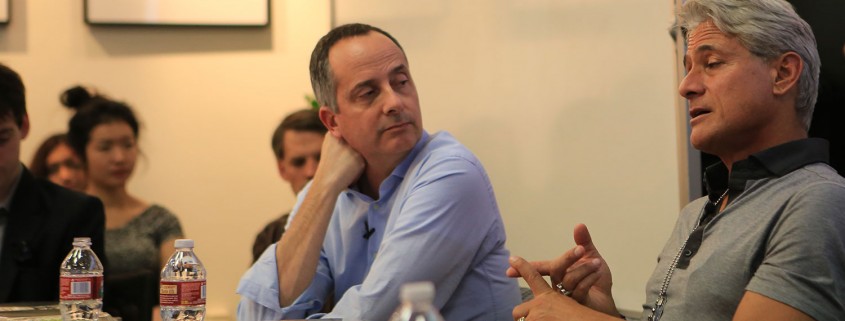Olympic diver discusses overcoming HIV/AIDS
U.S. Olympic gold medalist Greg Louganis visited USC to talk to students and faculty about sports, diplomacy and LGBT rights.
Jian (Jay) Wang, the director of USC’s Center on Public Diplomacy, began the presentation introducing Greg Louganis as “the greatest athlete of our time and one of the greatest divers in history.”
Louganis is known for his outstanding performance in both the 1984 and 1988 Olympic Games, where he took home gold medals in both the springboard and platform diving competitions. During his presentation, he shared his experience as an Olympic gold medalist, as a member of the LGBT community and as a survivor of HIV.
Louganis described the 1988 Olympic Games.
“I was 28 and it was an Olympic year. About six months earlier I was tested for HIV. I’m a serial monogamous, so I thought I was pretty safe,” Louganis said. “It came back that I was HIV positive. That was kind of the tipping point for me.”
He said it was difficult to be training for the Olympics while simultaneously living with HIV.
“I had to take two pills every four hours,” Louganis said. “So I’m training all day while constantly being reminded that I had a compromised immune system.”
During the 1988 Olympic Games in Seoul, Louganis cracked his head on a diving board. He remembers this incident as the day he thought the secret of being HIV positive would be revealed.
“I was paralyzed by fear,” Louganis said. “There was a stigma attached to HIV at the time. Gays, IV drug users and prostitutes were grouped together.”
It was through acting that Louganis found the strength to open up about his sexuality and condition. In Larry Kramer’s play “The Normal Heart,” Louganis played Darius, a character who “had HIV and was out and proud on TV.” The play follows an organization’s fight to raise money and awareness for HIV and AIDS in New York City in the early 1980s. At this time the disease was shrouded in mystery and thus the fight for formal recognition at this time was controversial.
Louganis said that the role helped him springboard other aspects of his career.
“I’m on stage night after night playing this role thinking, what’s my next goal? I knew I wanted to write a book,” Louganis said. “It was really raw and honest. It forced me to really look at the aspects of my life.”
Since coming out to the public in 1994 and releasing his book “Breaking the Surface” in 1995, Louganis has become an advocate for inclusion in sports and supporter of individuality.
“Breaking the Surface” follows Louganis’s struggles from a young age with accepting his homosexuality, depression and domestic abuse.
Robert Zubiate, a first-year graduate student studying public administration, said he was inspired by the courage Louganis exhibited in his fight against HIV.
“What resonated with me was really how strong he is. I enjoyed hearing about people openly telling others that they [has] HIV positive or that they identify as LGBT, acknowledging that that takes a lot of strength, determination, and acceptance,” Zubiate said.
Louganis has experienced moments of triumph, during which progress for the LGBT community has been made. Nonetheless, Louganis admitted he has also experienced hardship.
Louganis opened up about the LGBT Open Games held in Moscow, where he and only one other athlete represented the U.S. The treatment received at the games was testament to the stigma that exists around sexual orientation.
“We were supposed to have an LGBT panel but when the host found out what the group was they shut off the lights and told us to leave,” Louganis said.
He talked about a figure skating workshop Konstantin Yablotskiy, a professional skater held for the group.
“We were just a group of people doing what we do but within 20 minutes we were shepherded off the ice,” Louganis said.
An audience member asked about the reaction of Louganis’s teammates to his sexuality.
“There were some incidences where there were signs saying, ‘beat the fag,’” he said. “Once my book came out the coach’s son came up to me and said, ‘I’m so sorry. I didn’t put the signs up, but I also didn’t take them down.’”
Louganis said self-confidence is a key component of success.
“The biggest thing anyone can do I think is be true to themselves. Having the confidence to be who I am is empowering. I was diagnosed at 28, I didn’t expect to see 30. Here I am at 55, and it’s really amazing. The best thing I can do is just be myself.”
Lypheng Kim, a freshman majoring in biological sciences, felt a personal connection to Louganis’ story, having experienced similar hardships.
“What he said about allowing athletes to come out at their own time … caused me to think about my own experience,” Kim continued. “People are afraid that there is no one there to support them. When I came out I realized there are family members who aren’t blood-related who consider you as your family and they are there to support you.”
Louganis concluded by reiterating the importance of continuing the progress being made for the LGBT community.
“When I have the opportunity to make a positive impact I always say yes,” Louganis said. “Everyone should understand, we have made tremendous progress in this country, but we still have a long way to go.”

